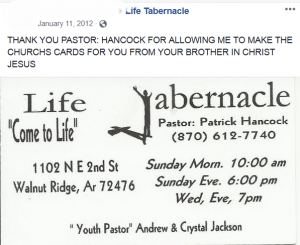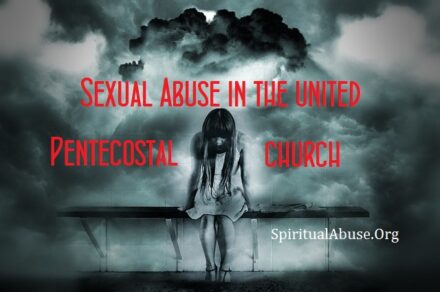The following article is a compilation of information obtained through numerous court records, some newspaper articles and a few Facebook and Twitter posts. The quotes interspersed throughout the article are taken directly from testimony at the trial and are included to bring awareness to child sexual abuse. Please note that this lengthy, though brief in comparison to the court records and appeals, does not cover all details of the case. The Rule 37 Petition and subsequent appeals themselves are very involved and I am not an attorney. This is Part 20 of an ongoing series.
The misconception is that a child who was abused would hate their abuser. Children hate and love the abuser at the same time. Because it’s that relationship – that intrafamiliar relationship. There is a relationship outside the abuse. Whether it’s a parent/child, whether it’s a sibling, an uncle, a relative, or someone in a position of authority – a scout master or Girl Scout leader – it’s someone that has dual purpose and dual role in these children’s lives so these children, they – and we see when this abuse manifests itself in children where they develop psychological issues. – Tracy Childress, a forensic interviewer
 M.S. and I.S. (the latter was adopted) are sisters who in 2014, at the ages of 16 and 13, were allegedly raped by Andrew Lee Jackson, their 28 year old youth pastor at Victory Tabernacle [link no longer works and was not archived], an affiliated United Pentecostal Church located at 3840 Albert Pike/1255 Mill Creek Road in Hot Springs, Arkansas where Brian Ferrell is pastor. After the story hit the news, the Facebook Page for the church was taken down, though there is an unofficial Page. [Edit: On August 20, 2021, a new one was started.] In it Jackson had been listed as the church youth pastor. A Facebook group for the church was later started on February 6, 2016. According to testimony, Jackson began his position at Victory Tabernacle in September 2012.
M.S. and I.S. (the latter was adopted) are sisters who in 2014, at the ages of 16 and 13, were allegedly raped by Andrew Lee Jackson, their 28 year old youth pastor at Victory Tabernacle [link no longer works and was not archived], an affiliated United Pentecostal Church located at 3840 Albert Pike/1255 Mill Creek Road in Hot Springs, Arkansas where Brian Ferrell is pastor. After the story hit the news, the Facebook Page for the church was taken down, though there is an unofficial Page. [Edit: On August 20, 2021, a new one was started.] In it Jackson had been listed as the church youth pastor. A Facebook group for the church was later started on February 6, 2016. According to testimony, Jackson began his position at Victory Tabernacle in September 2012.
Prior to then, he was a student/youth pastor at Life Tabernacle in Walnut Ridge, previously known as First United Pentecostal Church, and located at 1102 NE 2nd  Street. Patrick Hancock was the pastor starting in 2011 until 2017 and prior to then it was Bryan Hobbs, who since being pastor no longer holds license with the UPCI. They are also an affiliated church. (UPCI churches may be affiliated or non-affiliated, but both are equally considered to be part of the UPCI.) It should be noted that while his younger brother Austin Jackson has held license in the UPCI since 2011, Andrew has never been licensed though he claimed to be called to the ministry.
Street. Patrick Hancock was the pastor starting in 2011 until 2017 and prior to then it was Bryan Hobbs, who since being pastor no longer holds license with the UPCI. They are also an affiliated church. (UPCI churches may be affiliated or non-affiliated, but both are equally considered to be part of the UPCI.) It should be noted that while his younger brother Austin Jackson has held license in the UPCI since 2011, Andrew has never been licensed though he claimed to be called to the ministry.
In January 2014, Jackson befriended this “family and brought them into the church. He allowed their oldest daughter who was 16 to move in with him and his wife. He allowed a younger child who was 13 at the time to spend certain nights in his home. During the time the girls were in his house, he proceeded to engage in sexual intercourse with both girls.” The family consisted of the two parents and five children. Andrew Lee Jackson did not have a criminal history prior to these charges.
Andrew Lee Jackson was born on March 7, 1986. On April 9, 2011 he married Crystal Marie, who he met at church. At the time of his arrest he worked as a laborer on construction sites. He was brought up in the United Pentecostal Church and Phillip Hedden was his pastor starting at age two. Hedden, who testified at the trial, is an ordained minister with the UPCI and is pastor of the Redfield United Pentecostal Church. [In 2024, Phillip Hedden is seen as the Section 2 Presbyter of the Arkansas District.]
The Investigation And Charges
On November 6, 2014, Sergeant Michael V. Wright of the Garland County sheriff’s office received a call from Kathy Finnegan, an investigator with the Arkansas State Police Crimes Against Children Division, about the allegations lodged against Andrew Lee Jackson via the child abuse hotline. The following day she forwarded the report to him and an investigation commenced. At that time, Wright had been investigating child abuse cases for over ten years.
On November 7, 2014, I.S. was interviewed at the Cooper Anthony Mercy Child Advocacy Center and disclosed that between August and October 2014, Jackson had sexual intercourse with her three times in his home at 103 Viking Lane in Hot Springs, Arkansas. I.S. frequently spent the night at the Jackson home where she, Andrew and his wife slept on the living room sectional, which they separated into three pieces. It was there that the rapes occurred, while Crystal was asleep. M.S. was also interviewed but denied there was sexual contact with Jackson.
Andrew Lee Jackson was interviewed on December 11, 2014. He denied the allegations and stated that his only relationship with I.S. was as her youth pastor. He continued to deny the allegations throughout his trial and appeals. When Sergeant Wright inquired about his relationship with the sisters he asked, “Never anything beyond a brotherly/family-type relationship?” Jackson responded, “That’s all it was. It’s like the mom told us on Wednesday, this is something that she’s probably fantasized about and she made this up. Interview my wife. She was there. You’re not gonna take my word.”
It wasn’t until mid December that they became aware of text messages between I.S. and Jackson and these were retrieved from the phone she shared with her sister. The messages sent by Jackson revealed that the relationship went further than he stated, though no texts of a sexual nature were found. In one text he wrote, “I absolutely loved getting to lay with you last night and you basically falling asleep in my arms. I’ve missed that.”
On December 19, 2014 a probable cause affidavit was filed and a warrant was issued for his arrest. Jackson was arrested Dec. 22, 2014. Bond was set at $100,000 and posted. To protect the rights of Jackson, in early May 2015, a judge issued an order limiting pre-trial publicity through anyone connected to the case. His initial plea and arraignment occurred on June 2, 2015. He was represented initially by Travis Morrissey, who requested on July 20, 2015 to be relieved as his attorney as Jackson didn’t have the funds to pay his retainer fee.
Originally there were three counts of rape, Code 5-14-103(a)(3)(A), filed against Jackson on May 1, 2015, all involving I.S., who at the time was 13 years old. (There is almost exactly a 15 year difference between the two as each were born in the month of March.) The first count was for the dates between August 1 and 31, 2014; the second between September 1 and 30, 2014; the third between October 1 and 31, 2014. These rape charges are a Class Y felony. This was case CR-2015-226-IV.
M.S. was interviewed again on Sept. 21, 2016 and disclosed that she had intercourse with Jackson numerous times. While out on bond for the first charges, on September 29, 2016, a new probable cause affidavit involving M.S. was made. A warrant was issued on September 30 for his arrest on the new rape charges and Andrew turned himself in. By that time he was living in White Hall with his parents. The charges against Jackson were amended to 14 counts of rape involving I.S., the 13 year old, and included the 2014 dates of June 16-30, July 11, July 12, August 1-15, September 9, September 16, September 19, September 23, October 9, October 11, October 14, October 18, November 1 and November 14.
On October 21, 2016 Jackson was charged with an additional ten counts for the rape of M.S., Code 5-14-103(a)(4)(A)(i), who was 16 at the time and Jackson was considered her guardian (by virtue of a living arrangement, he was placed in an apparent position of power or authority over a minor). This was case CR-2016-662-IV. Bail was raised to $500,000. Jackson testified during the trial that, “In the summer of 2014, M.S.’s mother asked if we would allow M.S. to come and stay in our spare bedroom, so that she could have some space from her other siblings.” They resided in a small mobile home. He also shared that I.S. would stay over on the weekends and that sometimes one of their brothers would. All ten counts involved the dates between August 1-31, 2014. According to the probable cause affidavit, she stated it happened “at least 10 times” starting in August 2014 and continuing almost weekly through approximately October. These occurred in her bedroom at Jackson’s home and she claimed the first time he raped her, he covered her mouth and she fought against him. It was said that he threatened if she told anyone, he would burn up her home with her and her family inside. The plea and arraignment for the second set of charges was held on November 15, 2016.
On December 5, the two cases were consolidated together under case CR-2015-226-IV. On March 24, 2017, a second amendment was made for the charges. They were amended before the trial as each count is punishable by up to life in prison. They were changed to only two counts of rape: The first was for between June 1 and November 10, 2014 for 13 year old I.S. and the second count was for between August 1 and November 10, 2014 for 16 year old M.S.
More often than not as well through these children’s abuse, there have been threats made to them as well. We can’t take away that component. Because more often than not, our offenders don’t want our children to tell, so more often than not there’s threats, and on top of that preconceived idea of what a child may be feeling, like what could happen if they did speak out. – Tracy Childress, a forensic interviewer

Austin Jackson’s Letter To The Judge
Austin Jackson is a younger brother of Andrew and first obtained a local license through the United Pentecostal Church in 2011 and in the 2016 UPCI Directory he is seen holding a general license. In 2018 he became the Arkansas District Youth Secretary, a position still held as of the writing of this article. [He later became the Youth President.] From 2008 till 2013 he was youth pastor at the Redfield United Pentecostal Church under Phillip Hedden and since 2014 he has been student pastor at Apostolic Faith Tabernacle in Pearcy where Dennis Anderson is the pastor. [It appears in 2020 he became Staff Pastor at Sanctuary Church of Jonesboro.] In 2016 Austin wrote a 12 page Apostolic Bible study booklet, Pentecost is for Everyone.
On December 14, 2016, Austin wrote a three page letter to Judge Hearnsberger complaining that it had been two years since his brother Andrew was charged with rape and he had not yet had the chance to defend himself and was being unfairly treated. He requested that a more reasonable bond amount be fixed or for the original bond to be reinstated. From his letter, we learn that Andrew had worn an ankle monitor while he was out on bond pending trial. He shared that Crystal had stood by his side and they had their first child during this time. He made the claim that for two years the prosecution had been pressuring M.S. to claim Andrew raped her. He laments that now his brother was facing additional charges and he questioned how Andrew could have had intercourse with I.S. more than M.S. since M.S. actually lived at the home for a couple months. “This is interesting to me because they are saying he had sex more with the younger one than the older one. The older one stayed at his house for a while unlike the younger one, so that doesn’t even make sense that he had sex with the younger one more. So he now has 24 potential life sentences against him all based upon here say with no solid evidence of anything.”
For those who understand how potential victims are groomed, Austin shared some interesting things about his brother. “My brother has always been the type that has gotten close to way too fast. I could give several examples of this being his personality. Just a few short weeks and months after this family…moved two doors down from my brother and his wife, Andrew and Crystal befriended them, started eating dinner with them multiple times a week (almost every day), and started running errands for them and taking their kids different places, etc. …The only reason they let the older sister live with them was due to her not really having a suitable place to sleep at her parent’s house.” Crystal and Jackson’s mother both testified that Jackson never met/knows a stranger.
He went on to share that 119 friends and family members had signed a petition stating that Andrew was not a flight risk (after the second set of charges involving M.S., he had remained in prison as a $500,000 bond was required but was later released on the original $100,000 bond). He claimed Andrew was not a “risk to anyone at all.” We also discover that on September 22, 2016 Andrew Lee Jackson was offered a plea deal of 25 years in prison for the charges against I.S. and Austin felt that by offering it “they were willing to completely ignore what supposedly is ten more counts of rape they ‘have proof’ of.” Austin claimed that, “A trial is the last thing they want and it has become obvious.” He had no confidence that the then upcoming pre-trial and trial dates would happen and claimed his brother said he didn’t commit the crimes. Yet the trial did happen as scheduled and evidence was presented that convinced a jury of his guilt. Read the entire letter here.
A lot of times people have these preconceived ideas that once a child or teenager becomes sexually active or if they’re molested, that they automatically have findings and you can always tell. That actually is not true. Only about five percent of the time will we see findings that we can say, okay this is – we call it a transection. But ninety-five percent of the time in the vaginal area that’s completely normal. And there are a number of reasons for that.
…Another reason why it’s normal is a lot of times children don’t tell right away. Think of the tissue in the vaginal area, that hymenal tissue, it’s like the inside of your mouth because that’s a mucus membrane, and think back to when you’ve bit down really hard and maybe you were even bleeding and that hurts so bad. You look a week later and it’s completely gone, it heals without leaving any scarring. …The idea that if a child’s been sexually abused, especially at a young age, that we are able to just do an exam and see it is fiction. That is not the case. – Marcie Hermann, Cooper Anthony Mercy Child Advocacy Center
Trial And Conviction
Marcia Hearnsberger was the presiding judge while Michelle Lawrence and Kara Petro were the prosecuting attorneys and Christopher Shane Ethridge represented Andrew Lee Jackson. Ethridge was the cheapest attorney that Jackson said he could find as the court dismissed his request to supply him with a court appointed attorney as he was able to cover the $100,000 bond and it was stated that between him and his wife, they made about $800 per week. The trial was held from March 27-30, 2017.
Testimony from Sergeant Michael Wright showed that no DNA testing was performed and that Andrew Lee Jackson had disposed of his phone before Wright discovered information about text messages between him and the two sisters. It wasn’t until mid-December 2014 that he saw those.
Marcie Hermann of the Cooper Anthony Mercy Child Advocacy Center testified that they did not do an exam on M.S. but did one on I.S. The exam “did not have any physical findings. She looked completely normal. It was consistent with the allegations she made.” She was tested for several sexually transmitted diseases in order to make sure that she was free of infection. Hermann also noted “that her appetite had been decreased since all of this had come up.” She testified that her “findings were consistent with a child who has been sexually abused” and “was consistent with the disclosure she made.” She noted that I.S. later returned for a second interview.
Tracy Childress, a forensic interviewer employed at Mercy Hospital at the Cooper Anthony Mercy Child Advocacy Center, explained how these interviews are neutral, non-suggestive and non-leading and “developmentally appropriate for that child.” The interviewer “cannot introduce any information into the interview.” She testified that she interviewed I.S. twice and M.S. three times and noted, “There was sexual abuse disclosure. It was accidental disclosure with both girls.” She explained regarding I.S. that she “had been at school and was maybe overheard by having a conversation with another peer which led to her being questioned by a school counselor… Upon her being questioned, there was a denial and then it was after the fact, at a later date that I.S. went back to the school counselor out of concerns about herself and some dynamics that were unfolding with her …and then made an outcry and made a disclosure.”
Childress further testified that M.S.’s disclosure came about after an interview was ended as she was not ready to share and initially denied anything happened. M.S. was referred to counseling and then returned for two other interviews when she later was ready to talk. She stated that M.S. claimed she had been threatened by Jackson and that prevented her from telling all that happened, “She did give me the details and she also stated as to what threat had been made that prevented her for her to feel like she had the ability to speak to it.”
Childress shared, “Based upon my experience and expertise in forensic interviewing and child abuse accommodation, I believe that each of these girls were traumatized via sexual abuse. I believe that because I found I.S. to be credible and I found her to be consistent and congruent in her statements and she had no motive to fabricate. Both girls individually were able to give a deep understanding of that relationship and how they were in this relationship. They were both able to speak and, I hate to say textbook, but they were almost textbook as what you would expect with an accidental disclosure, with the dynamics that had been there, the culture that I.S. had been through in her life which had gotten her to this point. All those variables came into play and I found her to be very credible. The same with M.S. even more so. …both these girls expressed to me they did not want to lose a youth minister, they did not want him to have any suffering and they were actually trying to protect.”
The prosecution listed 25 names as potential witnesses, including Brian Ferrell, pastor of Victory Tabernacle, his wife and at least one other man from the church. Jackson’s defense listed only three (besides those already listed by the State) and included Jackson’s wife, a relative of Crystal, and Phillip Hedden, pastor of the Redfield UPCI church. Hedden testified that, “Andrew made fast friends with the people at church growing up and would commonly invite people to spend multiple days at his parents’ house. He would also visit other church members at their homes.” Both victims, the girls’ therapist, as well as Jackson and his wife, testified at the trial. The Sentinel Record reported on March 31, 2017 that the prosecution “presented witnesses who ‘saw various things’ which also corroborated the victim’s story, including one who ‘walked in’ on Jackson and the 16-year-old ‘under the covers’ and another who testified about being involved in a three-way phone call with Jackson and one victim.”
After about 90 minutes of deliberation, on March 30, 2017 an eight-man, four-woman Garland County Circuit Court jury found Andrew Lee Jackson guilty of two counts of rape and in less than 30 minutes they had agreed upon the recommended sentence. The sentence was set for forty years’ imprisonment on each count, and the judge ordered them to be served consecutively. A sentencing hearing was held April 11 and the order was filed on April 17, 2017. At the time of his sentencing, he was credited with 118 days already served. During sentencing Judge Hearnsberger noted, “They [the sisters] will probably have to be in trauma therapy for the rest of their lives. But in your statements to the jury and your statements during the trial, you never once conveyed any kind of remorse for what these children have gone through or what the consequences of your actions were. For these reasons, this sentence serves the purpose of deterrence. As far as rehabilitation goes, there cannot be any rehabilitation unless there’s some acknowledgement that your behavior was against the law. You cannot rehabilitate somebody who doesn’t think they did anything wrong and there’s no indication whatsoever in your entire sentencing that you have any recognition that anything you did was wrong except write some inappropriate texts. And certainly we’re not here because of inappropriate texts.”
Jackson will be required to serve about 56 years before he is eligible for parole and will be required to register as a sex offender should he ever be released.
On May 12, 2017, Jackson filed a petition to be declared indigent and requested the appointment of C. Shane Ethridge in order to file an appeal. This included a request for the State of Arkansas to pay for the attorney fees and the cost of the trial transcript. His request was granted by the judge.
In my forensic interviewing, I have not observed a scenario where the child just says it, tells all the details up front and then go on about their life. Statistically research has proven that most children never tell. There’s two types of disclosure with children. There is accidental disclosure and there is purposeful disclosure. An accidental disclosure would be a child – more often than not it’s a younger child – who could be in the bathtub getting a bath and say to the parent, “Oh, are you gonna tickle me here? That’s what so and so does.” That’s what an accidental disclosure would look like because a younger child has that spontaneity and doesn’t have the developmental capacity to understand the ramifications of what they’re referring to. They have no sexual knowledge. Where with older children, we know, statistically speaking, that more often than not it is an accidental disclosure. – Tracy Childress, a forensic interviewer
The First Appeal
C. Shane Ethridge filed an appeal on May 16, 2017, with the brief being filed December 28, 2017, claiming that the circuit court “erred by denying his request for a nonmodel jury instruction and by improperly limiting his cross-examination of Sergeant Michael Wright.” Because of these two points, he felt that it “should result in the convictions of the Defendant being reversed because they directly impacted the portrayal that the alleged victims were credible.” The time period between filing the appeal and the brief was caused, at least in part, by the time it took for the court reporter to complete the trial transcript. This is case CR-17-755.
On February 5, 2018, a response to the appeal was filed by Ashley Argo Priest, the attorney for the appellee and an Assistant Attorney General in Arkansas.
The Arkansas Court Of Appeals rightly pointed out that this appeal did “not challenge the sufficiency of the evidence to support his convictions” and the judges affirmed the actions of the circuit court, denying the appeal on April 4, 2018, with the record signed April 24 by Stacey Pectol. The Court of Appeals paid Jackson’s attorney $1,800 for his work.
One point of contention was that the judge did not allow Ethridge to question Sergeant Wright concerning non-related cases. He was wanting to bring up the fact that not every case Wright handled ended in a conviction and felt he had a personal bias against Jackson, causing him to do “less than the appropriate level of police investigation.” The Appeals Court found no direct evidentiary link and it was stated, “the fact that not every single person Sergeant Wright arrested was found guilty of a crime is not even marginally relevant to the question of whether Jackson raped I.S. and M.S.” In a later appeal by a different attorney, it was noted in regard to this point that, “This argument stood no chance of helping Mr. Jackson overturn his conviction.” The second point of contention was that during the testimony of the forensic examiner, Tracy Childress, she mentioned that she believed the girls to be credible.
…I have yet to meet a child who knows how to reconcile their own sexual abuse. These are children who are thrown into this adult world and there’s these dynamics that they have upon them and one of the biggest dynamics that they have facing them is the secrecy that’s attached to this abuse and that secrecy plays into that manifestation of them not knowing what to do which leads them into this helpless state. And when they’re in this helpless state and they’re trying to develop coping mechanisms to be able to – to be able to survive with this abuse, they become accommodating in their abuse because of the shame and this guilt. When these children are trying to reconcile their own abuse – they don’t know how to reconcile it. They can’t make sense of it. They’re left very helpless and it lends itself to this manifestation of that accommodation and then this cycle of abuse just continues.
And so we see with these children, more often than not, children don’t tell. Then when it is an accidental disclosure, which is seventy-eight percent of the time of documented cases, so seventy-eight percent of the time children do not purposely tell for the very fact that they have the helplessness and the shame and the secrecy attached. I mean sexual abuse doesn’t happen in the open. It’s an act that happens in private and that secrecy component within there entraps them in their own abuse and they have these preconceived concepts if it’s discovered or if I tell. They have these preconceived ideas of what may or may
not happen to a person. – Tracy Childress, a forensic interviewer
A Baby and Divorce
While out on bond for the first set of charges, in May of 2016, Andrew and Crystal had their first and only child, a baby girl.
Before the results of the appeal were determined, in February 2018, Crystal Marie Jackson filed for divorce from Andrew Lee Jackson and he agreed to it. It was granted on June 4, 2018.
Rule 37 Petition & Subsequent Appeals
The brief for a petition of relief under Rule 37 was filed by Jackson’s new attorney, Benjamin Eric Motal, on June 20, 2018. This petition usually argues that the individual “received ineffective assistance of counsel at trial.” Kara Petro responded on June 26 and Motel responded to the State’s motion to dismiss the following day. On July 18, 2018 the request was denied by Judge Hearnsberger. All of this lead to the next appeal.
In the June 20th brief where he noted 36 points regarding Jackson’s case, his attorney stated, “The day the allegations were first made, Mr. Jackson went to the accuser’s home and met with the girl and her parents. There, the girl apologized for making up the allegations about him. Jackson forgave her. The two families then proceeded to have dinner together.” Motal also makes mention that this case was not the only time where the accuser (meaning I.S.) had accused someone of sexual abuse. He states C. Shane Ethridge, “represented him in a manner that was so deficient it fell well below the standard mandated by the U.S. and Arkansas Constitutions.” He went on to claim that, “in Jackson’s case, the evidence was so lacking that no reasonable factfinder could have found that he had committed the crimes charged beyond a reasonable doubt based on the evidence presented at trial.” Yet the 12 member jury only needed approximately 90 minutes to pronounce him guilty on both counts of rape, so they were convinced of his guilt.
A notice of the filing of an appeal was made July 23, 2018 for case CR-18-717. On October 28, 2018 a brief was filed where Motal claimed that C. Shane Ethridge’s “performance was so deficient throughout the trial” and that after Jackson was declared indigent the court “appointed the same attorney who had botched his trial to represent him on appeal”. [Note: Jackson’s request to be declared indigent specified that Ethridge be appointed his attorney for the appeal. The court didn’t just pick him, it was requested.] The appeal claims that due to the actions of the court, “he was forced to retain an incompetent attorney”. He went on to state Jackson “was not afforded a fair trial and did not have any judicial authority review his convictions to determine whether the evidence offered against him was sufficient to support a finding of guilt beyond a reasonable doubt. This is a grave injustice that should shake any person who believes in the individual rights and fairness that our country was founded upon to their core.”
In November a response was filed by Vada Berger, the attorney for the appellee, and in December and January Jackson’s attorney filed more responses. On February 20, 2019 the Arkansas Court Of Appeals dismissed the appeal on the ground that Jackson had not personally verified his petition. Judge Bart Virden noted, “it is troubling that Jackson was denied the opportunity to comply with the verification requirement despite counsel’s timely attempts and Jackson’s repeated requests to do so on his own behalf.” See the Court’s Response here.
On February 22, 2019, Jackson’s attorney filed a Petition For Review to the Arkansas Supreme Court stating, “This case presents an issue of first impression, substantial questions of law concerning the interpretation of an Arkansas statute, and several significant issues needing clarification of the law or overruling of precedent”. On March 1, 2019 Vada Berger filed a response requesting that the review be denied. Case CR-19-171 is pending as of the writing of this article. May 1, 2019 UPDATE: On April 18, 2019, the Arkansas Supreme Court denied Jackson’s Petition For Review.
Disciplinary Violations
 Since his incarceration, Andrew Jackson has had some “major guilty disciplinary violations.” On June 10, 2021, there was the unauthorized use of mail or telephone and on June 28, 2021, he refused a direct verbal order.
Since his incarceration, Andrew Jackson has had some “major guilty disciplinary violations.” On June 10, 2021, there was the unauthorized use of mail or telephone and on June 28, 2021, he refused a direct verbal order.
Then on April 11, 2023 he was found to be in possession/manufacture of contraband.
As of this brief update [July 23, 2024], he is incarcerated at the East Arkansas Regional Unit in Brickeys, AR.
A Side Note
Though not directly related to this case, I feel it is only right to disclose that while I was writing this article, I discovered that Michael Vernon Wright was arrested on March 13, 2018 and charged with a felony count of theft. In April 2018 he pleaded guilty to an amended charge of theft of property more than $1,000 and was ordered to pay restitution in the amount of $11,380 to the Arkansas Narcotics Officers Association, where he had served as treasurer. He had previously resigned from the sheriff’s department on July 1, 2017 and the month prior he had admitted to taking funds from their account. For further details, see this article.
Court Records:
With the exception of the trial court transcript and some other documents, anyone interested may freely access quite a few of the court records for free at the Garland County Court Case Search website.
Articles:
Hot Springs youth pastor arrested in rape investigation – December 23, 2014
Youth pastor charged with raping 13-year-old – December 24, 2014
Garland County Inmate Details for Jackson, Andrew Lee – September 30, 2016 Booking
Ex-Arkansas youth pastor faces new rape counts – October 18, 2016
Former youth pastor convicted of rape – March 31, 2017
Former Arkansas youth pastor convicted of raping teen sisters – March 31, 2017
In 2 teens’ assaults in Arkansas, ex-pastor convicted – April 2, 2017
Former Arkansas youth pastor gets 80 years for raping 2 girls – April 13, 2017
Ex-youth pastor gets 80 years for raping girls – April 14, 2017
ANDREW LEE JACKSON V. STATE OF ARKANSAS (PDF File) – April 15, 2018
ARKANSAS COURT OF APPEALS (PDF File)- February 20, 2019
Arkansas Court of Appeals – February 21, 2019
You will find a complete list of articles in this series by clicking here.
********
Shop at our Amazon store! As an Amazon Influencer, this website earns from qualifying purchases.





